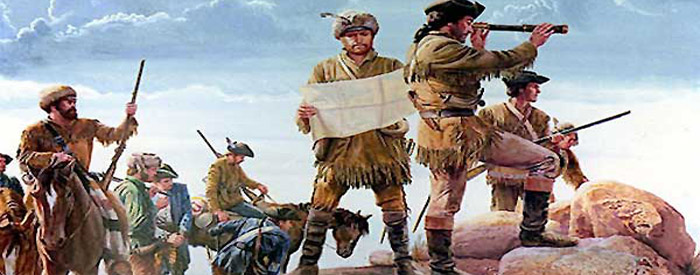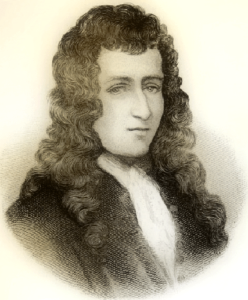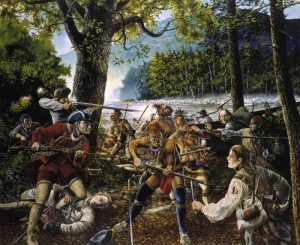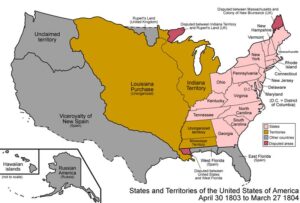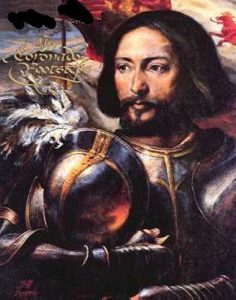The French. While the Spaniards were searching for wealth in the southern part of North America, the French were trading with the Indians in the northern part along the St. Lawrence River and around the Great Lakes. Among the French were many Catholic priests, called Jesuits, who came to carry their religious faith to the Indians. In 1673, one of these Jesuits, Father Jacques Marquette, accompanied a trader named Joliet on an expedition to explore the Mississippi River. They launched their canoes on the great river and floated downstream for hundreds of miles between shores that, in some places, were thickly wooded and, in others, were grassy plains. They went as far south as the mouth of the Arkansas River, then turned and began the long, hard task of paddling back.
La Salle and Louisiana, 1682. Among those who heard of the journey of Marquette and Joliet was a young Frenchman, Sieur de La Salle. He planned to explore the whole Mississippi basin and take possession of it in the name of the King of France. In 1682, with a few companions, he floated down the Mississippi River to its mouth. Here, with much ceremony, they planted a cross, buried a leaden plate inscribed with the arms of France, and declared that all the land drained by the Mississippi River and its tributaries should belong to France and be named Louisiana in honor of the French King, Louis XIV. Thus in 1682, nearly two centuries after the discovery of America, Kansas came into the possession of the French.
The End of Spanish and French Explorations. The French soon planted a few colonies and forts along the Mississippi River and sent out explorers, some of whom may have entered the present bounds of Kansas. This roused the Spaniards in Mexico, who wished to hold the territory for Spain, and they also sent expeditions. The armies of both nations suffered severely at the hands of the Indians, and the exploration of the Kansas country was given up by both Spain and France, and for nearly a century more, it lay almost forgotten. The next exploration of this territory was by the people of another nation.
The English. While the Spaniards were busy in the South and the French in the North, another people, the English, began to make explorations in the new continent. They did not come to hunt for gold or trade with the Indians but to find homes. They settled along the Atlantic coast between the French in Canada and the Spaniards in Florida and claimed the country westward to the Pacific Ocean.
Conflict of French and English Claims. As time went on and the settlements increased in number, the claims of the French and the English conflicted and caused much strife between the colonies of the two countries. The question of the ownership of the land was not settled until the close of the French and Indian War in 1763. As a result of this war, France gave up all her claims in America, practically everything east of the Mississippi to England, and that west of it to Spain. In 1800 Spain ceded her portion of America back to France.
The Louisiana Purchase, 1803. In the meantime, the English colonies had fought the Revolutionary War and became an independent nation. In 1803, when Thomas Jefferson was President, the United States bought her tract of country from France lying west of the Mississippi River. This was known as the Louisiana Purchase, and the date is one to be remembered, for it marks the end of French claims in America, and it marks the time when what is now Kansas became a part of the United States.
One Century More. Over three centuries of American history had passed, and the country west of the Mississippi River remained unsettled and practically un- known. The Spaniard and the Frenchman had come and gone, but the Indians still hunted the buffalo on the prairies. The white man had not yet made his home in Kansas country.
Summary. Spain explored in the South for wealth, France in the North to trade furs with the Indians, and England along the coast between these two to establish homes. Spain claimed the Kansas country because of the exploration by Francisco Vasquez de Coronado, France through the claims of Marquette and La Salle, and England through the ocean-to-ocean claim. None of the nations succeeded in accomplishing anything here, and the Kansas country was left alone for nearly a century after it came into the possession of France. At the close of the French and Indian War, the country west of the Mississippi was ceded to Spain. Later it came again into the hands of France and was purchased by the United States in 1803.
Compiled & edited by Kathy Alexander/Legends of America, updated January 2023. Source: Arnold, Anna E.; The State of Kansas; Imri Zumwalt, state printer, Topeka, Kansas, 1919.
Also See:
American History (main page)

